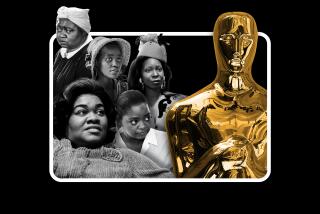‘The Moderns’ Paints Harsh Picture of the Lost Generation
- Share via
In Robert Altman’s film “The Player,” a secretary is admonished not to waste her time taking lunch with director Alan Rudolph. This is just one of “The Player’s” many inside jokes: Rudolph is an Altman protege and one of Hollywood’s most overlooked filmmakers.
One of Rudolph’s overlooked gems is “The Moderns,” an intriguing tale of romance, duplicity, gallantry and greed that saw only limited release in 1988.
The film, set in Paris during the 1920s, follows the escapades of Nick Hart (played by Rudolph regular Keith Carradine), an expatriate American artist who makes a marginal living drawing sketches for the Paris edition of the New York Herald Tribune.
Nick is a talented but abrasive artist, the son of a successful art forger. Broke, he agrees to enter a forgery scheme with his friend and art dealer, Libby Valentin (Genevieve Bujold). Meanwhile, he becomes involved with a former lover, Rachel (Linda Fiorentino), who is married to Bertram Stone (John Lone). Stone, an egomaniacal nouveau-riche American, is trying to break into Parisian high society by showing off his top-dollar art collection.
“The Moderns” unfolds against a lush backdrop of coffeehouses, bars, garrets and art galleries as members of America’s Lost Generation try to attach a modicum of meaning to their lives. Ernest Hemingway rubs elbows with Gertrude Stein; Coco Chanel sails through a local bar, and the Dadaists lurk in the background, ready to stage absurdist pranks.
“The Moderns,” co-written by Rudolph and Jon Bradshaw, is an incisive and sometimes scathing commentary of the art world. The symbiotic network of critics, dealers and investors is criticized unmercifully. In their world, debates about authenticity preempt any aesthetic concerns. Nick, with his simple forgery scam, seems innocent by comparison.
“The Moderns” (1988), directed by Alan Rudolph. 127 minutes. Not rated.
More to Read
Only good movies
Get the Indie Focus newsletter, Mark Olsen's weekly guide to the world of cinema.
You may occasionally receive promotional content from the Los Angeles Times.









